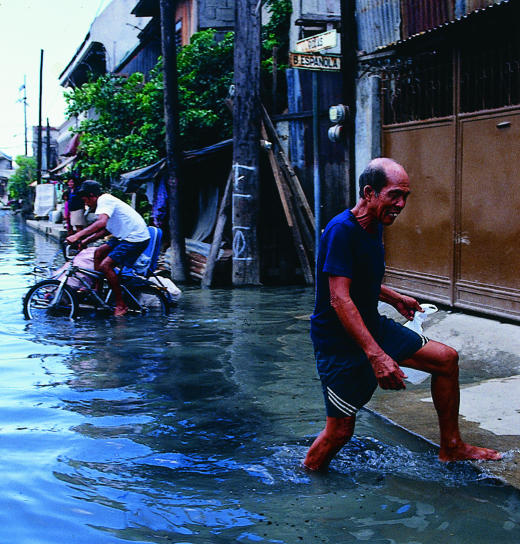Health officials in the Philippines have warned people not to wade in floodwaters this monsoon season after three times the usual number of cases of leptospirosis have been reported.
Flash floods are common throughout the Philippine archipelago during the monsoon season, which runs from June to December. They are particularly common in Manila, the country’s sprawling capital and home to 14 million Filipinos. After only minutes of a downpour, streets in low lying areas instantly become filthy rivers clogged with waste. Many Manilenos go out in the floodwaters barefoot, and children often swim in the flooded streets.
Leptospirosis is usually transmitted to humans through rats and their urine. However, bac-teria in the floodwater can also infect people by entering the body through cuts and skin abrasions. Infection causes influenza-like symptoms, with fever, myalgia, and headache. Most cases, if detected early, can be treated with antibiotics. Severe cases can lead to renal failure and, in some cases, death.
The increase in cases this year is unusual in that they occurred before the monsoon. “We are attributing this to the El Niño weather pattern. We’ve experienced a lot of extra rain and flooding because of this,” said Dr Maria Soledad Antonio of the Department of Health’s communicable disease control service.
Although the department has no nationwide figures, there have been 23 cases of leptospirosis and one death resulting from the disease at one Manila hospital so far this year. In the same period last year the hospital recorded just seven cases. Most of the cases have been among residents of poor, low lying areas. Workers in rice paddies and vendors in open air street markets are particularly at risk, according to Dr Antonio.
A lack of sanitary waste disposal and increasing rat populations have also contributed to the problem. Although no official statistics exist, rodent populations are believed to be rising. During the height of the dry conditions during the El Niño weather system, farmers in one province estimated that they were slaughtering around 800 rats a night in their rice fields. An effective rodent control programme is the best means of preventing leptospirosis, health officials have suggested. Dr Antonio said, however, that the Department of Health does not have the budget for this. For the time being, the department has issued advice to all government health clinics warning people not to wade or swim in the floodwaters.
Figure.
NANCY DURRETT-MCKENNA/PANOS PICTURES
Cases of leptospirosis in the Philippines have tripled in recent floods



